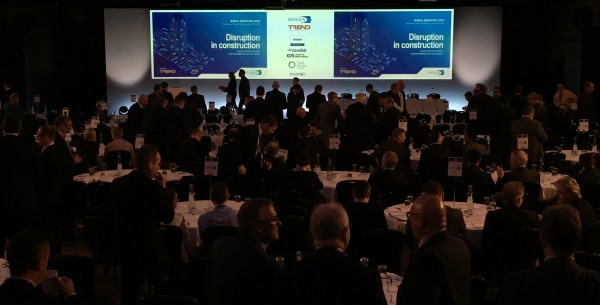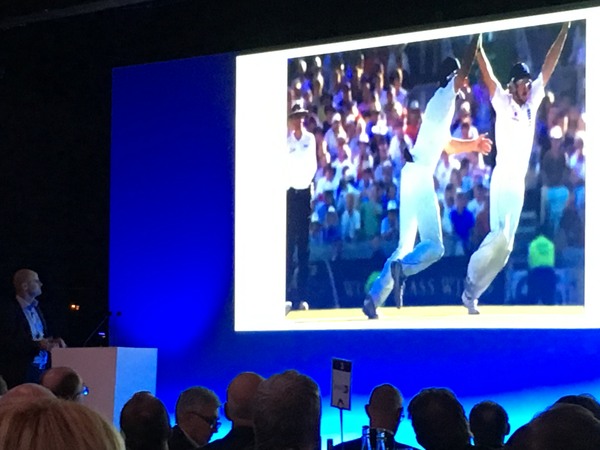BSRIA briefing 2018

|
| The BSRIA briefing 2018 took place at the Brewery in London on Friday 16 November. |
The theme ‘Disruption in Construction’ was introduced by Julia Evans OBE, Chief Executive at BSRIA, who gave a stark warning that we are "cursed to live in interesting times”. The Chair for the event, Oliver Zimmermann, CEO of Condair Group AG, then introduced the speakers, suggesting that disruption is inevitable as the industry is torn apart by technical and social innovation.
The first speaker, Susan Hone-Brookes, Chief Engineer for Construction, Infrastructure and Energy at the Manufacturing Technology Centre (MTC) placed current changes within the context of the 4th industrial revolution, highlighting the imminent danger of climate change, and suggesting we use our atmosphere like an open sewer. She questioned whether the industry would experience revolution or evolution, and pointed out that whilst both Google and the Egan report emerged in 1998, it is Google that has had a lasting impact on the industry. She highlighted poor productivity within the construction industry and predicted a period of consolidation as companies struggle with low margins.
She also cited some good news stories, such as the i3P model for industry collaboration, the development of the vertical factory for constructing high-rise buildings, and new technologies such as drones. She suggested it is difficult to predict what will come next, but we are likely to need creativity rather than encyclopaedic knowledge, and it is clear we will have to adapt to survive.
Speaking next, Michael Potter, Managing Director and founder of DriveElectric, said he is not a ‘tree hugger’ and has cars in his blood, but it is increasingly apparent that electric vehicles (EVs) are the future. Electric motors are more efficient that petrol or diesel engines, batteries are getting cheaper and range is improving. Infrastructure and charging however are still problems.
By 2027, half of all new car registrations will be EVs, and this could add 50% to peak demand for electricity in households. The timing of this demand does not map well against the availability of renewable energy, and there is a tendency for all vehicles to be plugged in early in the evening, charging at the same time. He suggested this was unnecessary as most vehicles would not actually be used until the morning, so demand management is possible to spread the load.
Philip Guthrie, Collaboration Hub Project Officer at the London Waste & Recycling Board (LWARB) spoke about the circular economy, in particular in relation to London where a circular economy route map has been created, driven by a combination of policy and demonstration projects. He cited the work they have done on the design of their own offices, putting their money where their mouth is, and advocated the development of meanwhile use spaces, performance-based systems and the leasing of equipment. He suggested we should be moving away from single-use buildings to re-useable buildings and said the key to success is collaboration.
Adrian Malone, Head of Digital Project Delivery and BIM at WSP Transport and Infrastructure, UK, focussed on the use of digital technologies to deliver transport infrastructure. He introduced the concept of the ‘digital twin’, making clear that this is not just a BIM model, but is a connected, real-time replica of the actual asset it represents. This generates a vast amount of data, that can be used in combination with technologies such as artificial intelligence to improve performance, and even to predict problems.
He talked about the increasing use of design automation, and suggested that the future would be one of ‘human-aided design’, driven by automatic software, and allowing engineers to focus on customer outcomes rather than design problems.
Will Squires, Digital Lead for Cities and Aviation at Atkins, introduced the complex and confusing subjects of bitcoin and blockchain. He spoke about the high transaction costs within the complex interactions of the construction industry, and suggested blockchain could be seen as a ‘trust machine’. This could be used to speed up payments, to improve security and to allow distributed project information, rather than the centralised ‘common data environment’ widely adopted today.
With $94 trillion of infrastructure spending required to deliver quality of life to the entire global population by 2040, the potential for savings is enormous. Blockchain can allow us achieve this without introducing a new point of failure.

|
| Lunch was followed by an inspirational talk from special guest, Andre Strauss OBE, one of the most respected cricketers in the world, and one of only three England captains to secure Ashes victories both at home and away. |
Andrew talked about what is required to achieve a high level of performance, and some of the reasons it does not always go according to plan. He suggested it is necessary to be able to think for yourself, that you should not treat your organisation like a lease car, and that you have to get rid of distractions.
Julia Evans wrapped up the event by thanking the speakers and the Chair.
For more information see: https://www.bsria.co.uk/news/article/bsria-briefing-2018-presentations-review/
--BSRIA
[edit] Related articles on Designing Buildings Wiki
Featured articles and news
Call for greater recognition of professional standards
Chartered bodies representing more than 1.5 million individuals have written to the UK Government.
Cutting carbon, cost and risk in estate management
Lessons from Cardiff Met’s “Halve the Half” initiative.
Inspiring the next generation to fulfil an electrified future
Technical Manager at ECA on the importance of engagement between industry and education.
Repairing historic stone and slate roofs
The need for a code of practice and technical advice note.
Environmental compliance; a checklist for 2026
Legislative changes, policy shifts, phased rollouts, and compliance updates to be aware of.
UKCW London to tackle sector’s most pressing issues
AI and skills development, ecology and the environment, policy and planning and more.
Managing building safety risks
Across an existing residential portfolio; a client's perspective.
ECA support for Gate Safe’s Safe School Gates Campaign.
Core construction skills explained
Preparing for a career in construction.
Retrofitting for resilience with the Leicester Resilience Hub
Community-serving facilities, enhanced as support and essential services for climate-related disruptions.
Some of the articles relating to water, here to browse. Any missing?
Recognisable Gothic characters, designed to dramatically spout water away from buildings.
A case study and a warning to would-be developers
Creating four dwellings... after half a century of doing this job, why, oh why, is it so difficult?
Reform of the fire engineering profession
Fire Engineers Advisory Panel: Authoritative Statement, reactions and next steps.
Restoration and renewal of the Palace of Westminster
A complex project of cultural significance from full decant to EMI, opportunities and a potential a way forward.
Apprenticeships and the responsibility we share
Perspectives from the CIOB President as National Apprentice Week comes to a close.






















